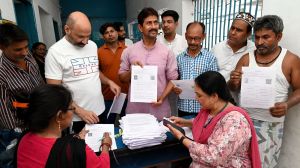Centre to states: DM, SP must bear cross for riots
In a move that lets elected representatives in states off the hook, the ministry of home affairs has decided to make district magistrates an...

In a move that lets elected representatives in states off the hook, the ministry of home affairs has decided to make district magistrates and superintendents of police personally accountable for any communal riots in areas under their jurisdiction.
The decision was taken by the ministry’s national integration cell late last month in the backdrop of the Gujarat riots. The cell had been asked to review the ‘Guidelines to Promote Communal Harmony’, and the only thing it could come up with was this. No provisions have been made to insulate the district authorities from political pressure.
The decision was conveyed in a note signed by home secretary Kamal Pande — and addressed to chief secretaries — to the state governments on July 15. The note said it had been decided ‘‘to make the district law-enforcing authorities, particularly the DM and the SP, personally responsible for maintaining communal harmony in their respective areas, and that complaints received from the members of minority communities should be attended to promptly and action taken against the culprits expeditiously.’’
A senior official pointed out that ‘‘both the national integration cell and the national foundation for communal harmony (also under the MHA) had received suggestions from all over the country for making the political leadership accountable, especially in wake of the Gujarat riots and the flak that the state government had received. But none of these was incorporated in the guidelines.’’ The ministry had also received several suggestions to insulate the local administration — the DM, SP and other officers — from political pressure ‘‘but these too were rejected by the ministry’’.
It was also decided to set up special intelligence units for handling communal problems and to give special training to the personnel manning them. According to the existing guidelines, the district administration is to keep a close watch on activities of organised communal groups and communally sensitive political organisations.



- 01
- 02
- 03
- 04
- 05




























